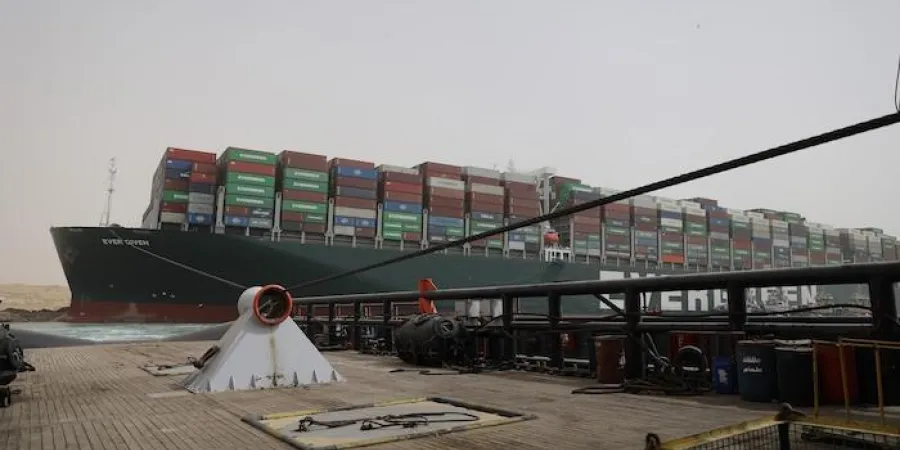The blocking of the Suez Canal: the next time, it could be the result of terror
A report by the Rand Corporation found that even in 2013 an old ship could be easily turned into a remote-controlled attack vessel, even one controlled by satellite communications
Dan Arkin
| 04/04/2021
The blocking of the Suez Canal by a giant container ship was an accident, but next time the blocking of the waterway could be caused by an intentional act of war or terror.
In an article on the Defense One website, Scott Savitz, an engineer and researcher for the Rand Corporation, describes the blocking of shipping routes by ships as an ancient method of war. There were those kinds of operations 1,000 years ago. The British used that method in the two world wars. And in 2014, the Russians blocked entrance to and exit from a port in the Crimean Peninsula by sinking two old ships, thus trapping the majority of the Ukrainian fleet within the port, which made it easier to take over Crimea.
In history, there are many examples of warfare and terror using the blocking of waterways. It is possible to bribe a ship's crew to intentionally crash into the waterway's partition or wall and block it. Today, it is possible to carry out a cyberattack that will shut down the boat's steering systems and prevent it from moving. Trapped ships and submarines are easy targets for missile or plane attacks.
It is very difficult to identify and locate ships whose crews intend to carry out attacks. Commercial ships are heavy, and it is hard to stop them. Explosives and various munitions can be hidden within a large ship, and be activated remotely. Electronic equipment that blocks and jams the signals of ships trying to free and move a stuck ship can be hidden within a vessel. Malware can be installed in the boat's electronic system and steering system.
The report by the Rand Corporation found that even by 2013 it was possible for unmanned ships to be used for an attack. An old commercial ship can easily be turned into an autonomous remote-controlled vessel, and that kind of vessel can even be controlled using satellite communications.
In recent days, the Rand Institute researcher concluded, it was proven how a single ship could cause an enormous amount of expenses and damage to international commerce. The Russians proved in the Crimean Peninsula what kind of damage can be caused by sinking two old ships at the entrance to the port. Ships operating in trade routes at sea are vulnerable, autonomous unmanned ships are potentially dangerous, and electronic warfare and cyber systems could be used maliciously and lethally.
A report by the Rand Corporation found that even in 2013 an old ship could be easily turned into a remote-controlled attack vessel, even one controlled by satellite communications
The blocking of the Suez Canal by a giant container ship was an accident, but next time the blocking of the waterway could be caused by an intentional act of war or terror.
In an article on the Defense One website, Scott Savitz, an engineer and researcher for the Rand Corporation, describes the blocking of shipping routes by ships as an ancient method of war. There were those kinds of operations 1,000 years ago. The British used that method in the two world wars. And in 2014, the Russians blocked entrance to and exit from a port in the Crimean Peninsula by sinking two old ships, thus trapping the majority of the Ukrainian fleet within the port, which made it easier to take over Crimea.
In history, there are many examples of warfare and terror using the blocking of waterways. It is possible to bribe a ship's crew to intentionally crash into the waterway's partition or wall and block it. Today, it is possible to carry out a cyberattack that will shut down the boat's steering systems and prevent it from moving. Trapped ships and submarines are easy targets for missile or plane attacks.
It is very difficult to identify and locate ships whose crews intend to carry out attacks. Commercial ships are heavy, and it is hard to stop them. Explosives and various munitions can be hidden within a large ship, and be activated remotely. Electronic equipment that blocks and jams the signals of ships trying to free and move a stuck ship can be hidden within a vessel. Malware can be installed in the boat's electronic system and steering system.
The report by the Rand Corporation found that even by 2013 it was possible for unmanned ships to be used for an attack. An old commercial ship can easily be turned into an autonomous remote-controlled vessel, and that kind of vessel can even be controlled using satellite communications.
In recent days, the Rand Institute researcher concluded, it was proven how a single ship could cause an enormous amount of expenses and damage to international commerce. The Russians proved in the Crimean Peninsula what kind of damage can be caused by sinking two old ships at the entrance to the port. Ships operating in trade routes at sea are vulnerable, autonomous unmanned ships are potentially dangerous, and electronic warfare and cyber systems could be used maliciously and lethally.



